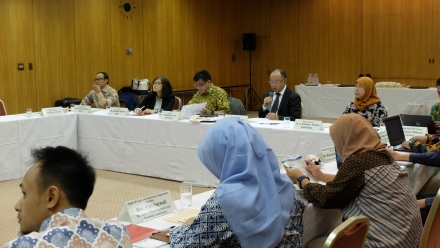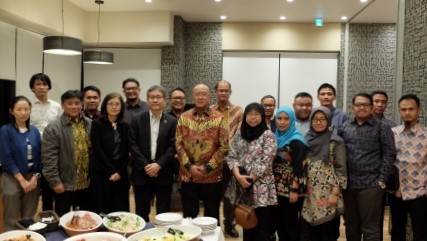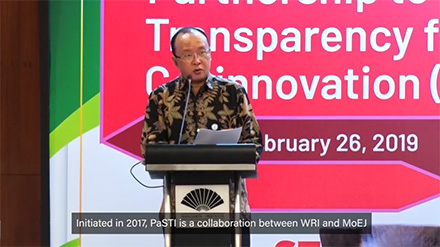The PaSTI supports Republic of Indonesia in improving monitoring, evaluation and reporting system and facilitating private sector engagements in climate actions based upon bilaterally signed Letter of Intent. The partnership contributes to implementing the Paris Agreement with the “PaSTI”, which means “sure” in Indonesian language.
The Ministry of the Environment, Japan and the Ministry of National Development Planning, the Republic of Indonesia collaboratively hosted an international workshop for PaSTI-Indonesia Project implementation
Jakarta, Indonesia / February 2019
The Ministry of the Environment, Japan (MOEJ) and the Ministry of National Development Planning, the Republic of Indonesia (BAPPENAS) organized an international workshop on February 26th, 2019 in Jakarta, Indonesia.
This event was aimed at providing a roadmap of the PaSTI-Indonesia project to the participants from the line ministries of Indonesia, academic institutions, media, private sector and related international organizations in line with outcomes from the inter-ministerial discussions, or “Focus Group Discussions (FGDs)”, carried out prior to this workshop.
Future steps of PaSTI-Indonesia project
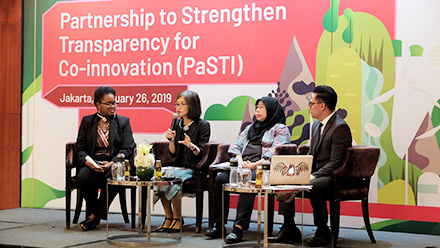
From left to right, Ms. Yamide Dagnet(WRI),
Ms. Masako Ogawa(MOEJ)
and Ms. Sudhiani Pratiwi(BAPPENAS)
in the international workshop
Dr. Ir. Sudhiani Pratiwi, Deputy Director of Environment Quality and Climate Change, BAPPENAS shared the PaSTI’s roadmap toward development of an integrated reporting system, incentive scheme, and capacity for enhanced transparency framework. In order for realization of the roadmap, she also emphasized needs of;
1) In-depth discussions concerning potential integration of existing reporting platforms;
2) Networking among both line ministries and private sector; and
3) Capacity building for relevant public / private institutions.
Sharing transparency actions at national and global level
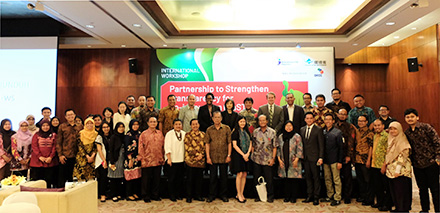
Participants in the international workshop
In the workshop, global actions in transparency under the Paris Agreement were also presented.
Ms. Masako Ogawa, Director for International Strategy on Climate Change, Global Environment Bureau, MOEJ provided her presentation on Japanese experiences in climate change countermeasures including Energy Conservation Act, Act on Promotion of Global Warming Countermeasures, Mandatory Greenhouse Gas Accounting, Reporting and Disclosure Program, and programmes to support private companies’ participation in climate change actions.
Ms. Yamide Dagnet, Senior Associate, World Resources Institute (WRI) shared the global context under the Paris Agreement. She considered it is essential for Indonesia to involve international activities such as PaSTI and engagements of financial sector in order to meet the global requirements.
Science Based Targets (SBT) and CDP as global initiatives led by non-state actors were also introduced. It was emphasized that private companies can obtain opportunities to attract investors and appeal to consumers by disclosing their climate-related information.
A series of inter-ministerial discussions for the roadmap of PaSTI-Indonesia Project was held
Jakarta, Indonesia / January and February 2019
In the PaSTI-Indonesia Project, consideration of integrated reporting system and incentive scheme for private sector is highlighted. In order to exchange views on possible ways of streamlining existing reporting platforms and involving the private sector, a series of inter-ministerial discussions called “Focus Group Discussions (FGDs)” was conducted.
Relevant line ministries including the Ministry of National Development Planning (BAPPENAS), the Ministry of Forestry and Environment, the Ministry of Industry, the Ministry of Energy and Mineral Resources, the Financial Services Authority, and relevant private organizations such as Indonesia Business Council for Sustainable Development actively participated in the FGDs.
Three FGDs were conducted in January and February 2018 with following objectives.
FGD 1 Introducing PaSTI project-Indonesia to Indonesian stakeholders and sharing the importance of private sector’s engagement in achieving the Intended Nationally Determined Contributions target in which Indonesia aims to reduce GHG emission by 29% from GHG emission baseline in 2030
FGD 2 Stocktaking information from line ministries upon the reporting platforms that currently existed and exploring the possibility of its integration
FGD 3 Discussing policies and regulations concerning the transparency frameworks, and incentive schemes and data security for the private sector
Through these FGDs, participants recognized that further discussions on requirements of each line ministries, data reliability, and benefits for the private sector are essential for developing integrated reporting system and incentive scheme in a cooperative manner. FGDs are to be continued in the future.
Japan and The Republic of Indonesia signed the Letter of Intent for the first bilateral cooperation under the PaSTI
Tokyo, Japan / September 2018
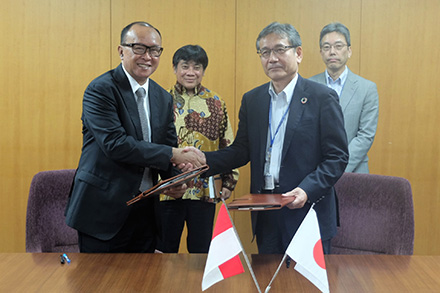
Second person from right: Mr. Yasuo Takahashi (MOEJ)
First person from left: Mr. Arifin Rudiyanto (BAPPENAS)
in the signing ceremony of the LoI
On September 26th, 2018, the Ministry of the Environment, Japan (MOEJ) and the Ministry of National Development Planning, the Republic of Indonesia (BAPPENAS) have signed the Letter of Intent (LoI). The objective is to develop Indonesia’s capacity for improving monitoring, evaluation and reporting of GHG emission and identifying potential and opportunities of mitigation actions by private sector with focusing on energy usage in industrial sector in Indonesia.
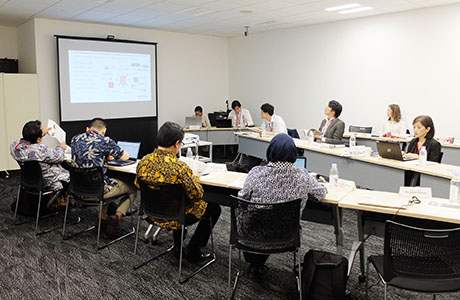
The first bilateral policy dialogue
The PaSTI-Indonesia Project under the LoI plans to implement mainly four pillars of activities indicated below in line with the relevant mitigation actions such as RAN-GRK, a National Action Plan For Reducing Greenhouse Gas Emissions of Indonesia.
- Capacity building on Enhanced Transparency Framework under the Paris Agreement
- Implementation scheme of integrated GHG emission reporting system among line ministries
- Pilot project implementation of incentive scheme for mitigation activities in private sector in Indonesia
- Policy brief on incentive mechanism and relevant methodologies based on the above outputs
For implementing the activities above, MOEJ and BAPPENAS also agreed to cooperate in coordinating relevant line ministries and sharing necessary information.
The first policy dialogue was held in Tokyo on September 26th and 27th, 2018. Participants including a representative from MOEJ and BAPPENAS exchanged views on the national policies and existing mitigation measure in Indonesia, and discussed a way of strengthening transparency actions through PaSTI-Indonesia Project. The dialogue was closed by confirming that this cooperation would bring benefit to stakeholders engaging in climate actions for both countries.
